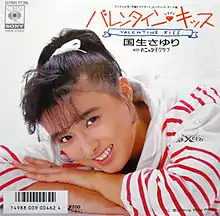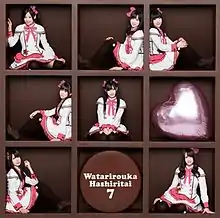Valentine Kiss
"Valentine Kiss" (バレンタイン・キッス, Barentain Kissu) is the solo debut J-pop single from Sayuri Kokushō (though it was billed on the cover as "Sayuri Kokushō with Onyanko Club) released on February 1, 1986 by CBS Sony in Japan. Kokushō was the eighth member of Onyanko Club. The B-side song was "Koi wa Ring Ring Ring" (恋はRing Ring Ring).
| "Valentine Kiss" | ||||
|---|---|---|---|---|
 | ||||
| Single by Sayuri Kokushō | ||||
| Released | February 1, 1986 January 6, 2008 (new version) | |||
| Genre | J-pop | |||
| Length | 3:34 | |||
| Label | CBS Sony | |||
| Songwriter(s) | Yasushi Akimoto | |||
| Sayuri Kokushō singles chronology | ||||
| ||||
The single ranked at number 2 on the Oricon charts,[1] and was rated fourth most popular on music program The Best Ten on TBS. It was also awarded the Japan Gold Disc Award for Best Single of the Year.[2]
While the title of the song is "Valentine Kiss", due to the often repeated chorus line of "Valentine Day kiss", the song is often called "Valentine Day Kiss".
"Valentine Kiss" was reproduced by Kokushō and resold in 2008 by Sony Music Direct. This remake reached number 135 on the Oricon charts.[3]
History
"Valentine Kiss" was the ending theme song for the Monday Drama Land series on Fuji TV in 1986. The single reached number 2 on the Oricon charts,[1] number 1 on the Music Lab and Music Research charts, and number 4 on The Best Ten music program on TBS. The single also won the Japan Gold Disc Award for Best Single of the Year.[2]
The song has become associated with Valentine's Day in Japan, and is regularly used in television programs and commercials which occur around that time. In a 2006 survey of people between 10 and 49 years of age in Japan, Oricon Style found Valentine Kiss to be the most popular Valentine's Day song, while it only sold 317,000 copies.[4] The singles it beat in the ranking were number one selling "Love Love Love" from Dreams Come True (2,488,630 copies), "Valentine's Radio" from Yumi Matsutoya (1,606,780 copies), "Happy Happy Greeting" from the Kinki Kids (608,790 copies). The final song in the top five was "My Funny Valentine" by Miles Davis.[4]
The makeup and hair styling featured in the cover image for the single were done by Kokushō herself.[5] "Valentine Kiss" was sung in 1986 as a feature of the "Today is special..." segment of the Yūyake Nyan Nyan variety show hosted by Onyanko Club. The song was used in the February 14, 2009 "Valentine After School" episode of Chūgakusei Nikki as the opening theme, and Kokushō sang it as the ending theme song as well.
Tracks
The album was a 45rpm vinyl single with one song on each side:
- "Valentine Kiss" (バレンタイン・キッス, Barentain Kissu) (3:34, lyrics by Yasushi Akimoto, composed by Hiroaki Sei, arranged by Jun Satō)
- "Koi wa Ring Ring Ring" (恋はRing Ring Ring) (lyrics by Yasushi Akimoto, composed by Hideya Nakazaki, arranged by Jun Satō)
Covers
Watarirouka Hashiritai
| "Valentine Kiss" | ||||
|---|---|---|---|---|
 | ||||
| Single by Watarirouka Hashiritai 7 | ||||
| Released | February 2, 2011 | |||
| Recorded | 2011 | |||
| Genre | J-pop | |||
| Length | 3:55 | |||
| Label | Pony Canyon | |||
| Songwriter(s) | Yasushi Akimoto | |||
| Producer(s) | Yasushi Akimoto | |||
| Watarirouka Hashiritai 7 singles chronology | ||||
| ||||
"Valentine Kiss" was recorded in 2011 by AKB48 sub-unit Watarirouka Hashiritai, under the name Watarirouka Hashiritai 7. The single debuted at number 2 on the Oricon weekly charts selling around 95,000 copies in its first week. Watarirouka Hashiritai 7's cover of the song is also the first to enter the top 10 and matched the original's ranking.[6]
Other covers
"Valentine Kiss" has been covered many times since its release. The all-girl ska band The Kitchen Gorilla released an Onyanko Club cover album titled "Onyanko Punk Love" in November 2003 which featured a cover of "Valentine Kiss".[7]
The song was covered as an ending theme song for the May 27, 2007 episode of the anime series Lucky Star, sung by the characters Tsukasa (Kaori Fukuhara) and Konata (Aya Hirano). It was also covered multiple times by multiple characters in the anime series The Prince of Tennis. From February 2004 through January 2013, a total of 13 different versions were released (seven individually, two together, another two together, and the final two alone), then continued well into the Reiwa era for a total of 21 different covers. The first one, featuring the character Keigo Atobe (voiced by Junichi Suwabe) reached number 14 on the Oricon charts.[8]
References
- 1986年2月オリコンシングルランキング [February 1986 Oricon Single Ranking] (in Japanese). オリコンランキングデータベース (Oricon Ranking Database). 2007. Archived from the original on March 17, 2010. Retrieved March 17, 2010.
- 第1回日本ゴールドディスク大賞 [1st Japan Gold Disc Award] (in Japanese). Recording Industry Association of Japan. 2002. Archived from the original on March 17, 2010. Retrieved March 17, 2010.
- バレンタイン・キッス 2008/国生さゆり [Valentine Kiss: 2008/Sayuri Kokushō] (in Japanese). Oricon Style Music. Archived from the original on March 17, 2010. Retrieved March 17, 2010.
- 大公開!『バレンタインソング』といえばこの曲! [The Great Exhibition! When speaking of a "Valentine song", this is the song!] (in Japanese). Oricon Style. February 3, 2006. Archived from the original on March 17, 2010. Retrieved March 17, 2010.
- "Down Town DX". Osaka, Japan. March 13, 2008. Yomiuri TV. YTV. Missing or empty
|series=(help) - 渡り廊下走り隊、国生さゆりのオリジナル以来25年ぶり2位 (in Japanese). Oricon. Retrieved February 7, 2011.
- "CD おニャン子パンクラブ" [(CD) Onyanko Punk Love] (in Japanese). Neowing. Retrieved March 17, 2010.
- バレンタイン・キッス/跡部景吾 with 氷帝学園中 [Valentine Kiss / Keigo Atobe with Hyotei Academy Chū] (in Japanese). Oricon Style. Archived from the original on March 17, 2010. Retrieved March 17, 2010.
